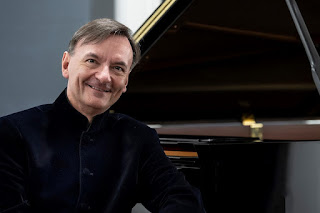Ageless masterpieces for an ISO audience stacked with young people
 |
| Stephen Hough is a favorite ISO guest soloist. |
Stephen Hough's guest appearances in Indianapolis go back a long way, even including a church concert with an area youth orchestra. But this weekend is his debut local engagement sporting a knighthood.
Over the summer, the venerable British pianist-composer became Sir Stephen Hough, so it was forgivable to imagine a new aura surrounding his return to the city with the Indianapolis Symphony Orchestra. The vehicle is the most expansive, and taxing, piano concerto in the standard repertoire: Brahms Second in B-flat major.
The performance grandly took up the concert's whole second half Friday evening at Hilbert Circle Theatre. The program is due to be repeated at 5:30 p.m. today. The initial offering had the heartening presence of many young people, including a contingent of students from the Indiana University Jacobs School of Music and a cadre of young adults representing Forte, the ISO support group for their demographic.
Jose Luis Gomez, a Spaniard who has been music director of the Tucson Symphony Orchestra since 2016, is on the podium, enjoying the guest spotlight alone for the concert's first half: Verdi's Overture to "La Forza del Destino" and Strauss's Suite from "Der Rosenkavalier."
The operatic origin of both concert staples encouraged his demonstrative podium manner. Gomez also seemed overjoyed to be making his ISO debut, applauding the orchestra and complimenting it in remarks from the podium after the overture.
 |
| Jose Luis Gomez is appearing here for the first time. |
The curtain-raiser was highly charged in Friday's performance, and the lyrical contrasts were suffused with sentiment. After the clarinet solo, it took a short while for the rhythmic pulse to become precise. Otherwise, with the score's dramatic pauses stitched into place and every resumption of the stormy music around the "fate" theme firmly torrential, the rendition was soul-stirring.
A different sort of soul-stirring grabs hold in the middle of Richard Strauss' suite from his 1910 hit opera, "Der Rosenkavalier." Well-known for its technically anachronistic celebration of the waltz in a story set in the 18th century, the suite also holds up the vocal trio and duo that signal the turning of the opera's focus on love. I always respond to this music with a temporary acquisition of COVID symptoms: chills, fever, shortness of breath, and (unconfirmed by the CDC) near tears. The illusion is short-lived, but it's always a treasurable set of symptoms, and so it proved Friday night.
Among the solos that fleck the lavish orchestration, concertmaster Kevin Lin's had the right spirit of entreaty and devotion. After the snare drum rolls back into play, the orchestra gave the climax great swing and weight.
The last time Hough soloed with the ISO, he played Rachmaninoff, and he is also known on record for spiritually lighter, but technically demanding, Romantic music. It's not surprising that, while he took to Brahms with evident seriousness, he didn't pull back from the blithe, scampering passages and the work's abundant gracefulness. The piano writing even has a pixieish quality in the scherzo second movement and in parts of the finale, and Hough had fun catering to it.
The third movement, imbued with the expected magical quality of the opening and recurring cello solos by Austin Huntington, became ethereal toward the protracted conclusion. The floating quality evident in Brahms' songs and late pieces for piano solo makes a prophetic appearance here, and Gomez guided a warm, controlled account of it in partnership with the soloist. Given the crowning majesty of Hough's playing in the fourth movement, it was obvious that the prolonged ovation at the end was Indianapolis' way of shouting, "Welcome back, Sir Stephen!"



Comments
Post a Comment